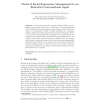Free Online Productivity Tools
i2Speak
i2Symbol
i2OCR
iTex2Img
iWeb2Print
iWeb2Shot
i2Type
iPdf2Split
iPdf2Merge
i2Bopomofo
i2Arabic
i2Style
i2Image
i2PDF
iLatex2Rtf
Sci2ools
ACII
2007
Springer
2007
Springer
Model of Facial Expressions Management for an Embodied Conversational Agent
Abstract. In this paper we present a model of facial behaviour encompassing interpersonal relations for an Embodied Conversational Agent (ECA). Although previous solutions of this problem exist in ECA’s domain, in our approach a variety of facial expressions (i.e. expressed, masked, inhibited, and fake expressions) is used for the first time. Moreover, our rules of facial behaviour management are consistent with the predictions of politeness theory as well as the experimental data (i.e. annotation of the video-corpus). Knowing the affective state of the agent and the type of relations between interlocutors the system automatically adapts the facial behaviour of an agent to the social context. We present also the evaluation study we have conducted of our model. In this experiment we analysed the perception of interpersonal relations from the facial behaviour of our agent.
ACII 2007 | Applied Computing | Facial Behaviour | Facial Behaviour Management | Interpersonal Relations |
Related Content
| Added | 06 Jun 2010 |
| Updated | 06 Jun 2010 |
| Type | Conference |
| Year | 2007 |
| Where | ACII |
| Authors | Radoslaw Niewiadomski, Catherine Pelachaud |
Comments (0)

